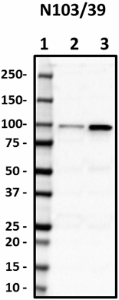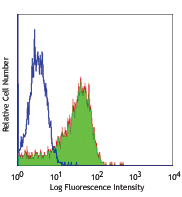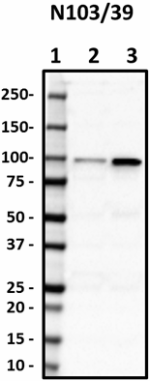- Clone
- N103/39 (See other available formats)
- Regulatory Status
- RUO
- Other Names
- FDH
- Isotype
- Mouse IgG1, κ
- Ave. Rating
- Submit a Review
- Product Citations
- publications

-

Western blot of purified anti-ALDH1L1 antibody (clone N103/39). Lane 1: Molecular weight marker; Lane 2: 30 µg of human brain lysate; Lane 3: 5 µg of mouse liver lysate. The blot was incubated with 0.2 µg/mL of the primary antibody overnight at 4°C, followed by incubation with HRP-labeled goat anti-mouse IgG (Cat. No. 405306). Enhanced chemiluminescence was used as the detection system. -

IHC staining of Purified anti-ALDH1L1 (clone N103/39) on formalin-fixed paraffin-embedded human cerebellum. Following antigen retrieval using Sodium Citrate H.I.E.R., 1X (Cat. No. 928502), the tissue was incubated without (panel A) and with (panel B) 5 µg/mL of Purified anti-ALDH1L1 (clone N103/39) followed by incubation with Alexa Fluor® 647 Goat anti-mouse IgG (Cat. No. 405322) for 1 hour at room temperature. Nuclei were counterstained with DAPI (Cat. No. 422801). Images were captured with a 40X objective. Scale bar: 50 µm
| Cat # | Size | Price | Quantity Check Availability | Save | ||
|---|---|---|---|---|---|---|
| 856801 | 25 µg | 67€ | ||||
| 856802 | 100 µg | 132€ | ||||
Aldehyde dehydrogenase family 1 member L1 (ALDH1L1) was originally discovered as an enzyme that catalyzes the conversion of 10-formyltetrahydrofolate to tetrahydrofolate, with NADPH and CO2 as by products. ALDH1L1 is most exclusively expressed by astroglial cells1 implicating these cells as the major components of folate-dependent formate oxidation in the brain.
Product DetailsProduct Details
- Verified Reactivity
- Human, Mouse
- Antibody Type
- Monoclonal
- Host Species
- Mouse
- Formulation
- Phosphate-buffered solution, pH 7.2, containing 0.09% sodium azide.
- Preparation
- The antibody was purified by affinity chromatography.
- Concentration
- 0.5 mg/mL
- Storage & Handling
- The antibody solution should be stored undiluted between 2°C and 8°C.
- Application
-
WB - Quality tested
IHC-P - Verified
ICC, IHC-F - Reported in the literature, not verified in house - Recommended Usage
-
Each lot of this antibody is quality control tested by Western blotting. For Western blotting, the suggested use of this reagent is 0.2 - 5.0 µg per mL. For immunohistochemistry on formalin-fixed paraffin-embedded tissue sections, a concentration range of 1.0 - 10 µg/mL is suggested. It is recommended that the reagent be titrated for optimal performance for each application.
- Application Notes
-
Additional reported applications (for the relevant) formats include immunocytochemistry3 and immunohistochemistry on frozen tissue sections1.
- Application References
-
- Zuo H, et al. 2018. J Neurosci. 38(9):2359 (IHC-F)
- Kidana K, et al. 2018. EMBO Mol Med. 10:e8184 (WB)
- Tian E, et al. 2016. Cell Reports. 16:781 (ICC)
- Product Citations
-
- RRID
-
AB_2783463 (BioLegend Cat. No. 856801)
AB_2783464 (BioLegend Cat. No. 856802)
Antigen Details
- Structure
- ALDH1L1 is a 902 amino acid protein with an apparent molecular mass of ~ 99 kD.
- Distribution
-
Tissue Distribution: Brain, Liver, Colon, and Kidney.
Cellular Distribution: Extracellular, cytosol, and plamsa membrane. - Function
- ALDH1L1 catalyzes the conversion of 10-formyltetrahydrofolate to tetrahydrofolate.
- Biology Area
- Cell Biology, Neuroinflammation, Neuroscience, Neuroscience Cell Markers
- Antigen References
-
- Neymerer V, et al. 1997. Brain Res. 766(1-2): 195
- Brandebura AN, et al. 2018. Dev Neurobiol. doi: 10.1002/dneu.22633.
- Garwood CJ, et al. 2017. Neuropathol Appl Neurobiol. 43(4):281
- Gene ID
- 10840 View all products for this Gene ID 107747 View all products for this Gene ID
- UniProt
- View information about ALDH1L1 on UniProt.org
Related Pages & Pathways
Pages
Related FAQs
Other Formats
View All ALDH1L1 Reagents Request Custom Conjugation| Description | Clone | Applications |
|---|---|---|
| Purified anti-ALDH1L1 | N103/39 | WB,IHC-P,ICC,IHC-F |
Customers Also Purchased


Compare Data Across All Formats
This data display is provided for general comparisons between formats.
Your actual data may vary due to variations in samples, target cells, instruments and their settings, staining conditions, and other factors.
If you need assistance with selecting the best format contact our expert technical support team.
 Login / Register
Login / Register 











Follow Us